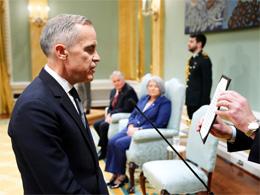Ottawa must cut red tape to spur economic growth

Commentary
By Julio Mejía
Prime Minister Mark Carney should recognize a simple fact—Canada has a regulation problem, which discourages business investment and stifles economic growth. And if we don’t solve the problem, we risk falling further behind the United States.
Since his re-election in November, President Donald Trump has vowed to cut “job-killing” red tape, promised to eliminate 10 regulations for each new regulation, and directed federal agencies to halt the enforcement of burdensome and potentially unlawful regulations.
To amplify these efforts, the Department of Government Efficiency (DOGE) launched a website tracking the regulatory complexity across government agencies in Washington.
Meanwhile in Canada, Canada’s regulatory burden is growing. CFIB estimates that in 2024 businesses spent 735 hours on regulatory compliance—58 hours more than in 2020. Meanwhile, the annual cost of dealing with regulations jumped from $45.4 billion in 2020 to $51.5 billion in 2024 (inflation-adjusted).
This growing regulatory burden isn’t just costly—it also creates uncertainty, erodes productivity by forcing business to spend time and resources navigating the bureaucracy, and ultimately deters investment.
Not surprisingly, business investment in Canada—measured on a per-worker basis—has plummeted by 33 per cent, from $18,600 in 2014 to about 14,000 in 2024 (inflation-adjusted).
Moreover, according to renowned economist Jack Mintz, from “2016 through 2022 close to $225 billion in capital was lost as more direct investment left the country than came here.”
Even before Trump’s deregulatory campaign, the 2024 OECD Regulatory Restrictiveness Index ranked Canada as the most restrictive country for foreign investment in both the G7 and North America—behind the United States and Mexico—due to regulatory barriers in sectors such as telecommunications, agriculture, mining and finance.
Red tape is also hurting investment in Canada’s energy sector, our main source of exports. According to the latest survey of oil and gas investors, 68 per cent of respondents said uncertainty about environmental regulations deters investment in Canada’s oil and gas sector compared to 41 per cent in the U.S. And 54 per cent said Canada’s regulatory duplication and inconsistencies deter investment compared to only 34 per cent for the U.S. (This survey was also conducted before Trump’s regulatory rollbacks.)
Investment is key to increasing incomes and improving living standards; it provides workers with the tools and technology to produce more and better goods and services. Less investment also means less money to develop new projects, infrastructure and technologies, and consequently fewer jobs and less economic opportunity for Canadians across the country.
While Parliament was off for months, the Trump administration was busy cutting red tape to create a more welcoming investment climate.
Now, the new Carney government should adopt its own reform agenda to reduce regulations and spur economic growth, for the benefit of Canadian workers and their families.









